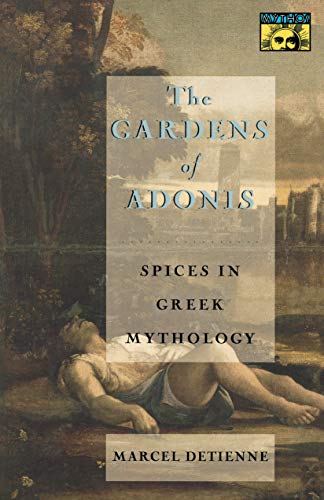Verwandte Artikel zu The Gardens of Adonis: Spices in Greek Mythology -...
The Gardens of Adonis: Spices in Greek Mythology - Second Edition (Mythos: The Princeton/Bollingen Series in World Mythology) - Softcover

Inhaltsangabe
Rich with implications for the history of sexuality, gender issues, and patterns of Hellenic literary imagining, Marcel Detienne's landmark book recasts long-standing ideas about the fertility myth of Adonis. The author challenges Sir James Frazer's thesis that the vegetation god Adonis- whose premature death was mourned by women and whose resurrection marked a joyous occasion-represented the annual cycle of growth and decay in agriculture. Using the analytic tools of structuralism, Detienne shows instead that the festivals of Adonis depict a seductive but impotent and fruitless deity-whose physical ineptitude led to his death in a boar hunt, after which his body was found in a lettuce patch. Contrasting the festivals of Adonis with the solemn ones dedicated to Demeter, the goddess of grain, he reveals the former as a parody and negation of the institution of marriage. Detienne considers the short-lived gardens that Athenian women planted in mockery for Adonis's festival, and explores the function of such vegetal matter as spices, mint, myrrh, cereal, and wet plants in religious practice and in a wide selection of myths. His inquiry exposes, among many things, attitudes toward sexual activities ranging from "perverse" acts to marital relations.
Die Inhaltsangabe kann sich auf eine andere Ausgabe dieses Titels beziehen.
Über die Autorin bzw. den Autor
Marcel Detienne is Gildersleeve Professor of Classics at Johns Hopkins University.
Von der hinteren Coverseite
Rich with implications for the history of sexuality, gender issues, and patterns of hellenic literary imagining, Marcel Detienne's landmark book, first published in 1972, recast long-standing ideas about the fertility myth of Adonis. The author challenges Sir James Frazer's thesis that the vegetation god Adonis - whose premature death was mourned by women and whose resurrection marked a joyous occasion - represented the annual cycle of growth and decay in agriculture. Using the analytic tools of structuralism, Detienne shows instead that the festivals of Adonis depict a seductive but impotent and fruitless deity - whose physical ineptitude led to his death in a boar hunt, after which his body was found in a lettuce patch. Contrasting the festivals of Adonis with the solemn ones dedicated to Demeter, the goddess of grain, he reveals the former as a parody and negation of the institution of marriage. Detienne considers the short-lived gardens that Athenian women planted in mockery for Adonis's festival, and explores the function of such vegetal matter as spices, mint, myrrh, cereal, and wet plants in religious practice and in a wide selection of myths. His inquiry exposes, among many things, the way sin which women of various martial statuses were regarded and attitudes toward sexual activity ranging from "perverse" acts to marital relations.
„Über diesen Titel“ kann sich auf eine andere Ausgabe dieses Titels beziehen.
EUR 4,14 für den Versand von USA nach Deutschland
Versandziele, Kosten & DauerNeu kaufen
Diesen Artikel anzeigenEUR 11,59 für den Versand von Vereinigtes Königreich nach Deutschland
Versandziele, Kosten & DauerSuchergebnisse für The Gardens of Adonis: Spices in Greek Mythology -...
The Gardens of Adonis: Spices in Greek Mythology - Second Edition
Anbieter: ThriftBooks-Atlanta, AUSTELL, GA, USA
Paperback. Zustand: Good. No Jacket. Former library book; Pages can have notes/highlighting. Spine may show signs of wear. ~ ThriftBooks: Read More, Spend Less 0.65. Artikel-Nr. G0691001049I3N10
Anzahl: 1 verfügbar
The Gardens of Adonis
Anbieter: BooksRun, Philadelphia, PA, USA
Paperback. Zustand: Good. Second. Ship within 24hrs. Satisfaction 100% guaranteed. APO/FPO addresses supported. Artikel-Nr. 0691001049-11-1
Anzahl: 1 verfügbar
THE GARDENS OF ADONIS Spices in Greek Mythology
Anbieter: Ancient World Books, Toronto, ON, Kanada
Paperback. Zustand: Very Good+. Foxing to top of textblock. ; Rich with implications for the history of sexuality, gender issues, and patterns of Hellenic literary imagining, Marcel Detienne's landmark book recasts long-standing ideas about the fertility myth of Adonis. The author challenges Sir James Frazer's thesis that the vegetation god Adonis-- whose premature death was mourned by women and whose resurrection marked a joyous occasion--represented the annual cycle of growth and decay in agriculture. Using the analytic tools of structuralism, Detienne shows instead that the festivals of Adonis depict a seductive but impotent and fruitless deity--whose physical ineptitude led to his death in a boar hunt, after which his body was found in a lettuce patch. Contrasting the festivals of Adonis with the solemn ones dedicated to Demeter, the goddess of grain, he reveals the former as a parody and negation of the institution of marriage. Detienne considers the short-lived gardens that Athenian women planted in mockery for Adonis's festival, and explores the function of such vegetal matter as spices, mint, myrrh, cereal, and wet plants in religious practice and in a wide selection of myths. His inquiry exposes, among many things, attitudes toward sexual activities ranging from "perverse" acts to marital relations. ; Mythos: the Princeton/ Bollingen Series in World Mythology; 256 pages. Artikel-Nr. 36100
Anzahl: 1 verfügbar
The Gardens of Adonis Spices in Greek Mythology Second Edition
Anbieter: Revaluation Books, Exeter, Vereinigtes Königreich
Paperback. Zustand: Brand New. reprint edition. 256 pages. 8.50x5.75x0.75 inches. In Stock. Artikel-Nr. x-0691001049
Anzahl: 2 verfügbar

